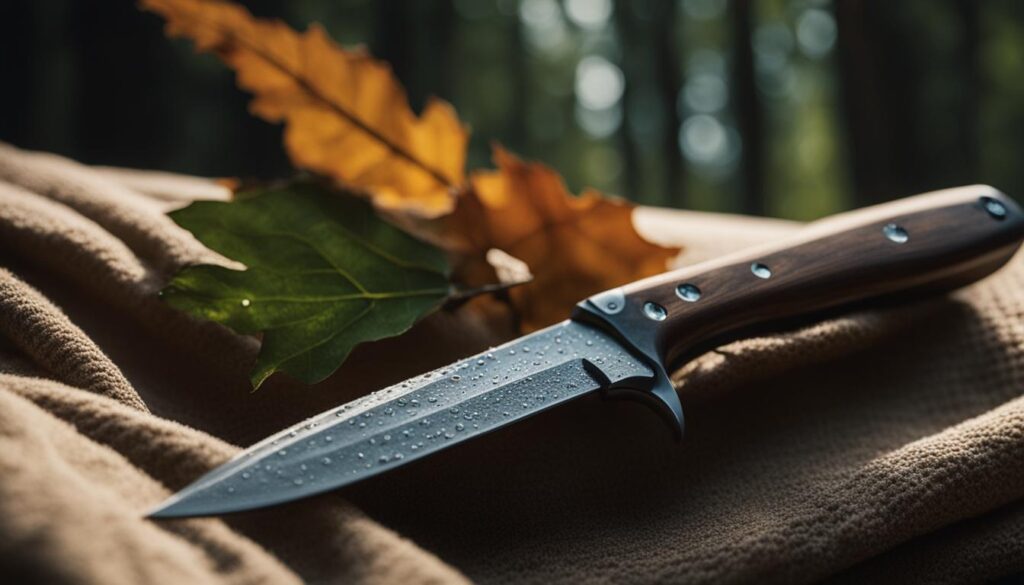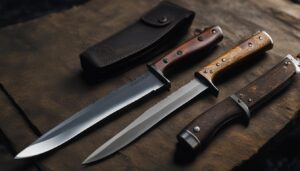As an avid hunter, I understand the importance of keeping your hunting knives in pristine condition. One of the biggest threats to the longevity and performance of your knives is rust. Rust can occur on any steel knife, but with the right preventative measures, you can ensure that your knives remain rust-free and ready for action.
Rust is a natural process that occurs when iron in the steel reacts with oxygen and water. It can be especially problematic for high carbon knives due to their higher carbon content and lower chromium levels. Stainless steel knives, while more resistant to corrosion, can still rust if not properly cared for.
To prevent rust on your hunting knives, there are several effective tips and techniques that you can implement. By understanding the factors that cause rust, implementing proper cleaning and drying techniques, performing regular maintenance, and using smart storage methods, you can significantly reduce the risk of rust formation.
Key Takeaways:
- Proper cleaning and drying techniques are essential to prevent rust on knives.
- Regular maintenance, including applying a thin layer of oil and regular sharpening, can help protect knives from rust.
- Choosing the right materials, such as stainless steel or high carbon steel with protective coatings, can also help prevent rust.
- Using smart storage methods, such as dry and safe places, knife blocks, magnetic knife holders, or sheaths, can further protect knives from rust.
- By following these tips and practices, you can keep your hunting knives rust-free and ensure they serve you well for years to come.
Understanding the Factors that Cause Rust on Knives
Rust formation on knives is a result of the reaction between iron in the steel, oxygen, and water. This chemical process leads to the development of a reddish-brown buildup on the surface of the blade. The main factors that contribute to rust formation are moisture and oxygen. It is important to have a clear understanding of these factors to effectively prevent rust on knives.
Exposure to moisture, particularly in humid environments, accelerates the rusting process. Similarly, contact with salt and acidic substances can increase the risk of rust formation. Therefore, taking steps to minimize exposure to these elements is crucial in preventing rust on knives.
By implementing preventive measures such as keeping the knife clean and dry, storing it properly, and avoiding contact with salt and acidic substances, you can significantly reduce the risk of rust formation. Now let’s take a closer look at each of these factors and how they contribute to rust on knives.
Moisture
Moisture acts as a catalyst for rust formation on knives. When the blade comes into contact with water, especially if left wet for an extended period, it creates an environment conducive to rust. This is why it is essential to dry the knife thoroughly after each use and store it in a dry place.
Oxygen
Oxygen in the air reacts with the iron in the steel, leading to the formation of iron oxide, commonly known as rust. Oxygen is ever-present in the atmosphere, making it impossible to completely eliminate. However, by minimizing exposure to oxygen through proper storage and maintenance, you can significantly reduce the risk of rust formation.
Salt and Acids
Salt and acidic substances can accelerate the rusting process on knives. Saltwater, in particular, is highly corrosive and can cause rapid rust formation. Furthermore, exposure to acidic materials can weaken the protective oxide layer on the blade, making it more susceptible to rust. Avoiding contact with salt and acids, and ensuring thorough cleaning and drying after use, are essential in preventing rust.
| Factors that Cause Rust on Knives | Preventive Measures |
|---|---|
| Moisture | Dry the knife thoroughly after use and store it in a dry place. |
| Oxygen | Minimize exposure to oxygen through proper storage and maintenance. |
| Salt and Acids | Avoid contact with salt and acidic substances, and ensure thorough cleaning and drying after use. |
Proper Cleaning and Drying Techniques
Proper cleaning and drying techniques are essential to prevent rust on knives. To ensure the longevity of your knives and maintain their optimal performance, follow these tips:
- Hand wash with care: Avoid putting your knife in the dishwasher as the heat and detergents can damage the blade. Instead, hand wash your knife using warm water and mild dish soap. Use a soft sponge or cloth to avoid scratching the blade.
- Thoroughly dry: After washing, dry the knife thoroughly with a clean towel. Pay special attention to any crevices where water can pool. It is important to clean and dry the blade immediately after use, especially if it has come in contact with acidic materials or moisture.
- Apply a protective wax: Applying a protective wax to the blade can help prevent rust formation. After cleaning and drying the knife, apply a thin layer of wax and buff it gently with a clean cloth. This will provide an additional layer of protection against moisture and oxidation.
By following these cleaning and drying techniques, you can effectively prevent rust on your knives and keep them in optimal condition for longer periods of time.

Remember, maintaining your knives properly is essential for their longevity and performance. Incorporate these cleaning and drying techniques into your knife care routine to prevent rust and ensure that your knives remain sharp and reliable.
Regular Maintenance and Smart Storage
Proper maintenance and storage are essential to prevent rust on your hunting knives and ensure their longevity. By following these practices, you can keep your knives in optimal condition and ready for use whenever you need them.
Maintaining Your Knives
Regular maintenance is key to keeping your knives rust-free and in top shape. Here are some important tips:
- After each use, clean your knife thoroughly with warm water and mild dish soap. Avoid using a dishwasher, as the heat and detergents can damage the blade.
- Dry the knife immediately after cleaning to remove any moisture. Pay special attention to any crevices where water can pool.
- Apply a thin layer of oil to the carbon steel blade after cleaning and drying. This will help protect it from rust and keep it in optimal condition.
- Regularly sharpen your knife to maintain a sharp edge. A sharp blade is less likely to develop rust.
Smart Storage Solutions
Proper storage is equally important to prevent rust on your knives. Here are some tips for smart storage:
- Avoid leaving your knife in water or storing it in a damp environment. Moisture can lead to rust formation.
- Store your knife in a dry place to minimize the risk of rust. Options include a knife block, magnetic knife holder, or sheath.
- If using a sheath, ensure it is clean and dry before placing your knife inside. This will prevent moisture from being trapped and causing rust.
- Avoid storing your knife in contact with other knives or utensils. This can lead to scratches or damage to the blade.
By following these maintenance and storage tips, you can prevent rust on your knives and ensure they are always ready for your next hunting adventure.


| Maintenance Tips | Storage Tips |
|---|---|
| Clean knife with warm water and mild dish soap after each use | Avoid leaving knife in water or storing it in a damp environment |
| Dry knife thoroughly to remove any moisture | Store knife in a dry place using a knife block, magnetic holder, or sheath |
| Apply a thin layer of oil to carbon steel blade after cleaning and drying | Ensure sheath is clean and dry before storing the knife |
| Regularly sharpen the knife to maintain a sharp edge | Avoid storing knife in contact with other knives or utensils |
Conclusion
Preventing rust on knives is a crucial aspect of knife care and maintenance. By implementing effective strategies, you can ensure that your knives remain rust-free and in optimal condition for years to come.
Understanding the factors that cause rust formation is key to prevention. Moisture and oxygen are the primary culprits, so it’s important to keep your knife clean and dry after each use. Avoid exposing your knife to salt, acids, and high humidity, as these can accelerate rust formation.
Proper cleaning and drying techniques are essential to prevent rust on knives. Hand wash your knife using mild dish soap and warm water, then dry it thoroughly with a clean towel. Pay attention to any crevices where moisture can accumulate. Applying a protective wax on the blade can also add an extra layer of rust prevention.
Regular maintenance and smart storage practices are equally important. Remember to apply a thin layer of oil to the blade after cleaning to protect it from rust. Store your knife in a dry place, using a knife block, magnetic knife holder, or sheath to keep it away from moisture and contact with other utensils. By following these tips and techniques, you can effectively prevent rust on your knives and preserve their longevity and performance.
FAQ
What is the main cause of rust on knives?
Rust forms on knives when iron in the steel reacts with oxygen and water, resulting in the development of a reddish-brown buildup. Moisture and oxygen are the main factors that contribute to rust formation.
Do all knives have the same risk of rusting?
Rust can occur on any steel knife, including carbon steel and stainless steel blades. However, high carbon knives have a higher risk of rust due to their higher carbon content and lower chromium levels.
Can stainless steel knives rust?
Stainless steel knives have a higher chromium content and are more resistant to corrosion but can still rust with abuse or lack of care.
What is the difference between rust and a patina?
Rust is a reddish-brown buildup that occurs when iron in the steel reacts with oxygen and water. A patina, on the other hand, is a protective surface layer that can develop on carbon steel blades and actually helps to prevent rust.
How can I prevent rust on my knife?
You can prevent rust on your knife by using coatings like Parkerizing or Cerakote, cleaning and drying the blade after each use, applying a protective wax, ensuring the sheath is dry, and using the right oil for rust prevention.
What materials are best for knives used in saltwater environments?
Knives used in saltwater environments should be made of materials that are specifically designed to be resistant to corrosion, such as stainless steel with high chromium content. Additionally, using appropriate coatings can provide extra protection.
How should I clean and dry my knife to prevent rust?
Avoid putting your knife in the dishwasher and instead hand wash it using warm water and mild dish soap. Dry the knife thoroughly with a clean towel, paying special attention to any crevices where water can pool.
What maintenance should I perform to prevent rust on my knife?
Applying a thin layer of oil to the carbon steel blade after cleaning and drying can help protect it from rust. Regular sharpening is also important to maintain a sharp edge and reduce the risk of rust formation.
How should I store my knife to prevent rust?
Avoid leaving the knife in water or storing it in a damp environment. Store the knife in a dry place, using a knife block, magnetic knife holder, or sheath to protect the blade from moisture and contact with other knives or utensils.
What should I do if my knife already has rust?
Using a rust eraser or metal polish can be effective in removing any rust or discoloration that may have occurred on the blade. Make sure to thoroughly clean and dry the knife afterward to prevent further rust formation.
Why is preventing rust on my knife important?
Preventing rust on your knife is crucial in preserving its longevity and performance. Rust can weaken the blade and affect its cutting ability. By implementing rust prevention measures, you can ensure that your hunting knives serve you well for years to come.





